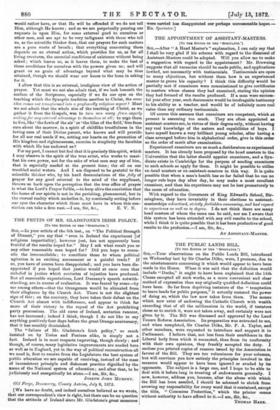THE APPOINTMENT OF ASSISTANT-MISTERS.
[TO THE EDITOR OF THE SPECTATOR.1
SIR,—After "A Head Master's" explanation, I can only say that I shall be very glad if his scheme with regard to the dismissal of Assistant-Masters could be adopted. Will you allow me to make a suggestion with regard to the appointment? Mr. Browning suggests that all vacancies should be made public, and applications invited, not necessarily with testimonials. Testimonials are open to many objections, but without them how is an experienced master to prove his capacity ? I think this difficulty would be partially met if examiners were commissioned to give certificates to masters whose classes they had examined, stating the opinion they had formed of the results produced. If a man were success- ful year after year, such documents would be irrefragable testimony to his ability as a teacher, and would be of infinitely more real value than any ordinary testimonials.
Of course this assumes that examiners are competent, which at present is assuming too much. They are often appointed as assistant-maatera are, in virtue of their degree only, without having any real knowledge of the nature and capabilities of boys. I have myself known a very brilliant young scholar, after having a class arranged before him in alphabetical order, give in this order as the order of merit after examination.
Experienced examiners are as much a desideratum as experienced masters. It has already been proposed by the head masters to the Universities that the latter should appoint examiners, and a Syn- dicate exists in Cambridge for the purpose of sending examiners to such schools as apply for them. It might be possible to utilise ex-head masters or ex-assistant-masters in this way. It is quite possible that when a man's health has so far failed that he can no longer rule boys day after day, be may make a most excellent examiner, and then his experience may not be lost prematurely to the cause of education.
With regard to the Governors of King Edward's School, Bir- mingham, they have invariably in their elections to assistant- masterships advertised, strictly forbidden canvassing, and had regard to experience as well as to degree. I do not think there are many head masters of whom the same can be said, nor am I aware that this system has been attended with any evil results to the school, while I think it is quite possible that it has been productive of good results to the profession.—I am, Sir, &a.,
AN ASSISTANT-MASTER.


































 Previous page
Previous page